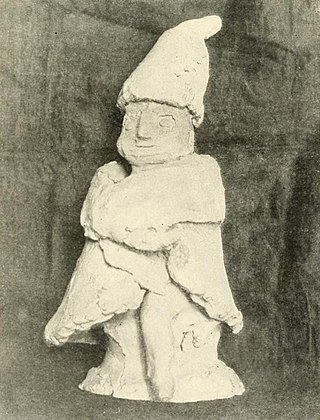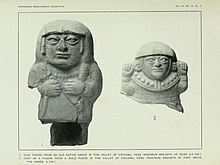
Profanity, also known as cursing, cussing, swearing, bad language, foul language, obscenities, expletives or vulgarism, is a socially offensive use of language. Accordingly, profanity is language use that is sometimes deemed impolite, rude, indecent, or culturally offensive; in certain religions, it constitutes sin. It can show a debasement of someone or something, or be considered an expression of strong feeling towards something. Some words may also be used as intensifiers.
Religion and mythology differ in scope but have overlapping aspects. Both are systems of concepts that are of high importance to a certain community, making statements concerning the supernatural or sacred. Generally, mythology is considered one component or aspect of religion. Religion is the broader term: besides mythological aspects, it includes aspects of ritual, morality, theology, and mystical experience. A given mythology is almost always associated with a certain religion such as Greek mythology with Ancient Greek religion. Disconnected from its religious system, a myth may lose its immediate relevance to the community and evolve—away from sacred importance—into a legend or folktale.

Sociology of religion is the study of the beliefs, practices and organizational forms of religion using the tools and methods of the discipline of sociology. This objective investigation may include the use both of quantitative methods and of qualitative approaches.

David Émile Durkheim was a French sociologist. Durkheim formally established the academic discipline of sociology and is commonly cited as one of the principal architects of modern social science, along with both Karl Marx and Max Weber.
Perkele is a Finnish word meaning "evil spirit" and a popular Finnish profanity, used similarly to English "god damn", although it is considered much more profane. It is most likely the most internationally known Finnish curse word.

Ukko, Äijä[ˈæi̯jæ] or Äijö[ˈæi̯jø], parallel to Uku in Estonian mythology, is the god of the sky, weather, harvest and thunder in Finnish mythology.

Mircea Eliade was a Romanian historian of religion, fiction writer, philosopher, and professor at the University of Chicago. He was a leading interpreter of religious experience, who established paradigms in religious studies that persist to this day. His theory that hierophanies form the basis of religion, splitting the human experience of reality into sacred and profane space and time, has proved influential. One of his most instrumental contributions to religious studies was his theory of eternal return, which holds that myths and rituals do not simply commemorate hierophanies, but, at least in the minds of the religious, actually participate in them.

Anthropology of religion is the study of religion in relation to other social institutions, and the comparison of religious beliefs and practices across cultures.
Gemeinschaft and Gesellschaft, generally translated as "community and society", are categories which were used by the German sociologist Ferdinand Tönnies in order to categorize social relationships into two types. The Gesellschaft is associated with modern society and rational self-interest, which weakens the traditional bonds of family and local community that typify the Gemeinschaft. Max Weber, a founding figure in sociology, also wrote extensively about the relationship between Gemeinschaft and Gesellschaft. Weber wrote in direct response to Tönnies.

A household deity is a deity or spirit that protects the home, looking after the entire household or certain key members. It has been a common belief in paganism as well as in folklore across many parts of the world.
The phenomenology of religion concerns the experiential aspect of religion, describing religious phenomena in terms consistent with the orientation of worshippers. It views religion as made up of different components, and studies these components across religious traditions in order to gain some understanding of them.
Profanity in Finnish is used in the form of intensifiers, adjectives, adverbs and particles. There is also an aggressive mood that involves omission of the negative verb ei while implying its meaning with a swear word.
Numinous is a term derived from the Latin numen, meaning "arousing spiritual or religious emotion; mysterious or awe-inspiring." The term was given its present sense by the German theologian and philosopher Rudolf Otto in his influential 1917 German book The Idea of the Holy. He also used the phrase mysterium tremendum as another description for the phenomenon. Otto's concept of the numinous influenced thinkers including Carl Jung, Mircea Eliade, and C. S. Lewis. It has been applied to theology, psychology, religious studies, literary analysis, and descriptions of psychedelic experiences.
Collective effervescence (CE) is a sociological concept coined by Émile Durkheim. According to Durkheim, a community or society may at times come together and simultaneously communicate the same thought and participate in the same action. Such an event then causes collective effervescence which excites individuals and serves to unify the group.
The "eternal return" is an idea for interpreting religious behavior proposed by the historian Mircea Eliade; it is a belief expressed through behavior that one is able to become contemporary with or return to the "mythical age"—the time when the events described in one's myths occurred. It should be distinguished from the philosophical concept of eternal return.
A hierophany is a manifestation of the sacred. The word is a formation of the Greek adjective hieros and the verb phainein.
Sacred describes something that is dedicated or set apart for the service or worship of a deity; is considered worthy of spiritual respect or devotion; or inspires awe or reverence among believers. The property is often ascribed to objects, or places.

Sociological and anthropological theories about religion generally attempt to explain the origin and function of religion. These theories define what they present as universal characteristics of religious belief and practice.
The Elementary Forms of Religious Life, published by the French sociologist Émile Durkheim in 1912, is a book that analyzes religion as a social phenomenon. Durkheim attributes the development of religion to the emotional security attained through communal living. His study of totemic societies in Australia led to a conclusion that the animal or plant that each clan worshipped as a sacred power was in fact that society itself. Halfway through the text, Durkheim asks, "So if [the totem animal] is at once the symbol of the god and of the society, is that not because the god and the society are only one?"

The definition of religion is a controversial and complicated subject in religious studies with scholars failing to agree on any one definition. Oxford Dictionaries defines religion as the belief in and/or worship of a superhuman controlling power, especially a personal God or gods. Others, such as Wilfred Cantwell Smith, have tried to correct a perceived Western bias in the definition and study of religion. Thinkers such as Daniel Dubuisson have doubted that the term religion has any meaning outside of western cultures, while others, such as Ernst Feil even doubt that it has any specific, universal meaning even there.










